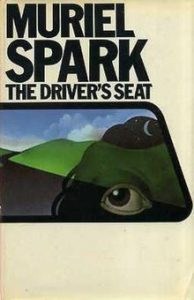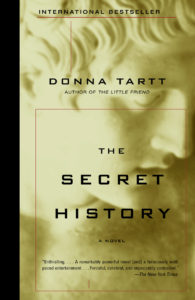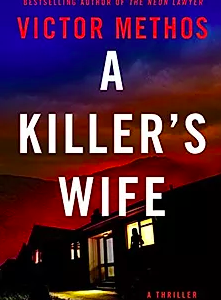It’s a game that I play with friends sometimes: can we think of a book that, technically, isn’t a crime novel? It’s harder than it seems. There’s rape and murder in Thomas Hardy, PG Wodehouse features reams of pig and helmet theft, hell, even Holden Caulfield hires, and then doesn’t pay a prostitute. Still, sometimes there are books where a crime is at the heart of the story but it just doesn’t feel like genre fiction.
When I was writing The Ruins I was aware that the book had a death right at the beginning, and that might set up expectations of a certain kind of book, with a certain set of rules. But in my bookshelves were books that took that same ignition point—a crime—and then spun off in a thousand different directions. They became love stories and science fiction, they could be filed under ‘picaresque fiction’ or ‘philosophy’. These were the books I turned to: novels about a crime that weren’t crime novels…

The Driver’s Seat by Muriel Spark
If it had been written by a French existentialist it would be hailed as a masterpiece; if it were a David Lynch film then it would be canonical. Instead The Driver’s Seat has been curiously sidelined by history. It’s a study in absurdism, with a precise, disconcerting dream logic. A woman is to be murdered, we’re told that up front. The days leading up to her death are blank and fractured; we watch her shop and argue, lie and steal, as she searches for the man who will end her life. She wanders aimlessly through an unnamed city as the feeling of impending fracture grows. And it ends as it begins, seemingly senselessly, but leaving a sickly, woozy taste in the mouth that stays with you for days.

The Yiddish Policemen’s Union by Michael Chabon
The joy of The Yiddish Policemen’s Union is the way it lures you in with the most comforting of literary tropes. It’s a hard-bitten detective story about a boozy, lovelorn policeman with a seemingly unsolvable case. There are hard-drinking cops. There are underworld kingpins. There are unspoken codes of honor. So far, so Raymond Chandler. But under the surface another kind of book is flexing its muscles. It’s a what-if novel in which the post-WWII Jewish homeland is Alaska rather than Israel and the Messiah may (or may not) be on his way. It’s a setting that lets Chabon riff on his favored themes. Tall tales are told, language is toyed with (the Alaskan Jews call themselves The Frozen Chosen) and it builds to a denouement as vast as it is unexpected.

Under The Skin by Michel Faber
A book about a serial killer that isn’t a crime novel. A book about aliens that doesn’t feel like sci-fi. Never has a book been so aptly named as Under The Skin. Faber’s protagonist, Isserley, an alien folded into the prison of a human body, tasked with hunting and killing lone hitchhikers on lonely Scottish roads, is an utterly convincing creation. You identify with her struggles even as she picks up another hapless victim. Faber’s book takes in big themes—identity, factory farming, slavery—but it’s Isserley that gets under your skin from the start. (Don’t worry if you’ve already seen the film – the book is a very different beast).

The Secret History by Donna Tartt
A crime is at the heart of Tartt’s book, but like a solar eclipse we never get to see it head on. Instead we see it reflected in little behaviors and rumors and hearsay. It makes for the smartest kind of page-turner. We’re lured inside with the narrator, Richard Papen, deep into a cult-like group of Classics students, as he tries to decrypt their secrets and find a way to fit in. His complicity with the group is mirrored in the reader’s; we know something terrible has happened but we, like Papen, can’t look away. Tartt is, as usual, wonderful in writing about friendship, snobbery and the deep appeal (and costly perils) of self-delusion.

419 by Will Ferguson
If you’ve ever wondered at the back-story of those Nigerian princes who have millions to give away via your laptop’s spam folder, then Will Ferguson has done the research that you’re going to need. He takes one such innocuous email and runs its story backwards and forwards in time. Ferguson’s Laura Curtis travels half the world to discover how the scammers who ruined her father operate as we watch the lives of those who run the emails from Lagos—from crime bosses to teenage operatives—but also the effect they wreak on the unwary and the gullible. Ferguson worked mainly in non-fiction before turning to fiction for 419 and it shows: this is detailed crime reporting wrapped up in a beguiling human story.

The City and the City by China Miéville
The opening scene of The City and The City could be the beginning of any number of gritty police procedurals. A dead body is found on some wastelands; police spread out to canvas witnesses; there the usual questions of jurisdiction and seniority. But it’s the setting of Miéville’s story that sets it apart. Two fictional Eastern European cities—Besźel and Ul Qoma—intertwine with each other, but the inhabitants stick fiercely to their own streets, even to the extent of ‘unseeing’ everything going on just feet from where they walk. Any transgressions are met with a kind of mystical uber-police force called Breach. Miéville, who seems to switch genres every time he releases a new book, interweaves these different stories as closely as he does the streets of the twinned cities. It’s a deft political satire, a fantasy tale of magic and history, and a totally convincing thriller written in part for his then-terminally-ill mother, who was a fan of police novels.

















